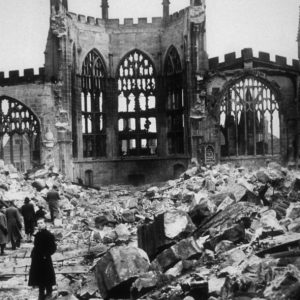Read through or download the concert program.
Month: November 2018
“Catharsis” is the wrong word: Britten’s War Requiem
Jenna Simeonov, Schmopera.
There was a moment of particular vitriol in Bramwell Tovey's brief remarks before giving the Toronto Symphony Orchestra its downbeat for Britten's arresting War Requiem. He said, "When the sun goes down, and when the sun comes up - and in the rain - we shall remember." It was a pointed, verbal bite directed at a US President who, 100 years after the official end of WWI, was too small and weak to pay an in-person visit to an American military cemetary outside Paris; he cited rain as his excuse, which is in horrific taste even as it is thinly-veiled code for pouting and narcissism.
There was bile on Tovey's tongue that rang into Roy Thomson Hall, and its effect lingered long enough to dovetail into the first bars of the War Requiem. I have always found something magnetic and charismatic about Tovey, and as silly as it may sound, to hear him indulge in a brief moment of personal feelings about the meaning of war and commemoration felt akin to hearing a friend's firsthand experience with tragedy.
Benjamin Britten’s War Requiem: A monumental commemoration of the WWI Armistice, November 11, 1918
David Richards, Toronto Concert Reviews.
Amid the ominous chimes cutting through the languid sounds of lower strings and percussion, came the words of the Latin mass for the dead, “Requiem aeterna”. The unmistakable musical reference to death and destruction was palpable. As the intensity of the orchestra and voices increased to a climactic cry of pain, an angelic choir of children sang out a prayerful warning “Te decet hymnus…”
Such was the beginning of the powerful War Requiem by Benjamin Britten. The Toronto Symphony Orchestra, Toronto Mendelssohn Choir and Toronto Children’s Chorus, over 300 performers in all, came together for a monumental production of Britten’s 1962 masterpiece of remembrance of the horrors of war. Conducted by Bramwell Tovey, it featured soloists well-prepared for their roles, each having performed it with major orchestras and choirs recently. Indeed, the vision of Britten in having Russian, German and English soloists share the same stage was brought to fruition in this performance, something Britten himself couldn’t quite accomplish for the work’s première when soprano Galina Vishnevskaya couldn’t get an exit permit from the U.S.S.R. In last night’s performance it was the Russian soprano Tatiana Pavlovskaya, British tenor Toby Spence, and Canadian/German baritone Russell Braun.
.... The Toronto Mendelssohn Choir for its part had some exemplary moments of great drama as well as reflective singing. The a cappella singing of “Pie Jesu Domine” was riveting. “Libera me” with tenor drum and rumbles from the slow march of the bass drum began as a sorrowful lament that built to a frightening vision of judgment by fire.
Toronto Symphony Remembers With A Moving Tribute To The Wastes Of War
Stephan Bonfield, ludwig Van Toronto.
Britten’s War Requiem: Toronto Symphony Orchestra, Toronto Mendelssohn Choir, Toronto Children’s Chorus, and soloists. Bramwell Tovey, conductor. Roy Thomson Hall. Nov, 8. Repeats Nov. 10.
The Toronto Symphony Orchestra presented its annual Remembrance Day concert Thursday night at Roy Thomson Hall and, as always befits these solemn occasions, gave another moving tribute to those lost in a century of war and senseless conflicts.
Last year it was Jeffrey Ryan’s immensely successful and evocative Afghanistan: Requiem for a Generation, but its model might well have been Benjamin Britten’s War Requiem, a pacifist’s prime exponent of music mourning the casualties of young lives lost amid the senseless wastes of war.
Thus, with this year being the 100th anniversary of Armistice Day, the end of the Great War, it was an excellent choice to perform Britten’s masterful six-movement setting of the traditional Latin Requiem text and Wilfred Owen’s eight poems that Britten used to commemorate the man who died one week before the official armistice took effect.
Owen’s writings, by his own admission, were less concerned with inherent poetic quality (they are brilliant regardless) and were rather more reflective about the war itself. Owen superimposed his own deeply personal faith upon his psychologically harrowing experiences, and his extant writings inspired Britten’s polished and eruptive score, abounding with sumptuous depictions of Owen’s inner state as proxy for our collective horrified response to war’s ludicrous devastations.
TMC announces winner of 2018 Choral Composition Prize
Edmonton choral singer and composer Russell Wilkinson is the winner of the TMC’s 2018 Debbie Fleming Prize for Choral Composition.
The fourth annual TMC Choral Composition Competition received 19 entries from across Canada. The winner of this competition receives the $1000 Debbie Fleming Prize for Choral Composition and their work is performed by the Toronto Mendelssohn Choir in concert.
The 2018 competition asked emerging composers to submit a sacred or secular work for the Christmas season. Submissions were reviewed by the jury of TMC Interim Conductor David Fallis, Festival of Carols guest conductor Howard Dyck, and TMC Associate Conductor Ezra Burke.
The winner was There Is No Rose by Russell Wilkinson. Russ is a retired lawyer living in Edmonton. Over the last 40 years he has sung with Greystone Singers (U. of S.), Edmonton Opera Chorus, Pro Coro Canada, I Coristi Chamber Choir and Da Camera Singers. Choral composition is a relatively recent endeavour which he hopes to continue in his retirement.



